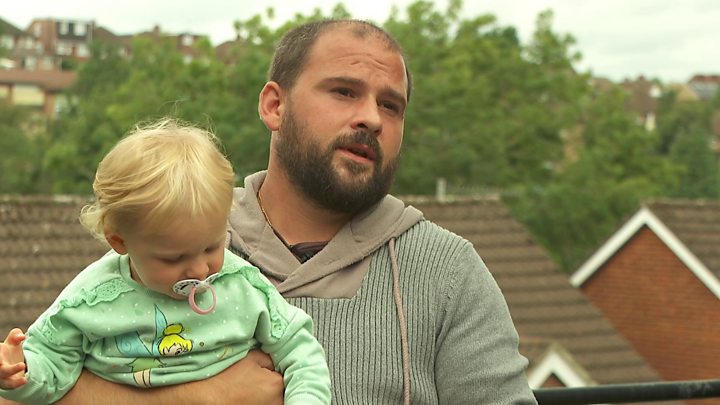The government has announced a “truce” on enforcement action for tenants facing eviction in England and Wales this Christmas.
It also said that evictions will not be enforced in areas subject to local lockdowns as the pandemic continues.
Housing Secretary Robert Jenrick added that it has increased notice periods to six months in an “unprecedented measure”.
Campaign group Generation Rent said the government “must offer [renters] more.”
The government confirmed that court proceedings for evictions in England and Wales would restart on 21 September after being suspended for six months due to the coronavirus crisis.
But under new measures announced on Thursday, evictions will not be enforced by bailiffs if a local area is in lockdown that includes restrictions on gathering in homes.
Bailiffs will also be told that they should not enforce possession orders over Christmas, other than in “the most serious circumstances”, such as cases involving domestic abuse or antisocial behaviour.
The government has not yet confirmed which dates the “winter truce” will cover for tenants in England and Wales.
“We have protected renters during the pandemic by banning evictions for six months – the longest eviction ban in the UK,” Housing Secretary Robert Jenrick said.
“To further support renters we have increased notice periods to six months, an unprecedented measure to help keep people in their homes over the winter months.
“It’s right that we strike a balance between protecting vulnerable renters and ensuring landlords whose tenants have behaved in illegal or anti-social ways have access to justice.”
The new measures are aimed at ensuring potentially vulnerable tenants are not forced out of their homes “at a time when public and local authorities may be dealing with an increased demand for services”, a statement said.
‘Months of uncertainty’
Ministers extended the ban on evictions for four weeks in August, but campaign groups and housing charities had hoped that more would be done for renters who have seen a loss in income during the pandemic.
Media playback is unsupported on your device
Alicia Kennedy, director at Generation Rent, said: “It is welcome that renters will not face eviction by bailiffs around Christmas or where there are lockdown measures.
“But outside that, thousands of renters who have had eviction notices during the pandemic still have no assurance from the government whether they can stay in their home.
“Those who have lost income will find it difficult to find a new home so face many months of uncertainty, getting deeper into debt.”
One survey by homelessness charity Shelter suggested that more than 170,000 private tenants have been threatened with eviction by their landlord or letting agent, and 230,000 in England have fallen into arrears since the pandemic started.
However, landlord groups have previously said that their members have been left “powerless” in dealing with the non-payment of rent.
Some have called for more help in England to reduce the financial pressures on landlords, in addition to mortgage holidays.
Advice for tenants
- Anyone under threat of eviction should start gathering evidence such as receipts for rent paid or any communications with your landlord
- Landlords have to give you notice before they can apply to court for a possession order. For most tenancy types this notice must now be at least three months in England or six in Wales, but lodgers may get less notice
- If a possession order had already been made against you before 27 March 2020, then your landlord may apply for this to be enforced when the ban comes to an end. You should receive 14 days’ notice of the eviction date
- Anyone now struggling to pay rent should speak to their landlord, and organise a repayment plan to pay off arrears
- Those receiving housing benefit or Universal Credit and unable to pay rent might be able to get a discretionary housing payment from the local council
Source: Citizens Advice

